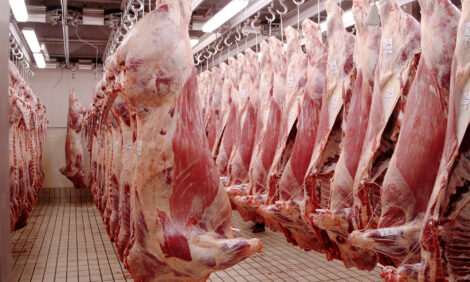



AMI Urges Congress To Minimize Impact of Ethanol Policy on Animal Ag
US - Congress and the Administration should consider tax incentives and other legislative vehicles to support energy-based opportunities for animal agriculture because of the increased demands on corn from the ethanol industry, said AMI President and CEO J. Patrick Boyle in testimony submitted to the House Committee on Ways and Means, Subcommittee on Select Revenue Measures. Boyle urged the House to take action to minimize the adverse affects of rising input costs on meat and poultry packers and processors.Boyle said that dramatically increased demand for corn has pressed market forces to demand higher feed prices. As a result, animal agriculture producers are considering alternatives to their feeding, nutrition, and dietary regimen which, in turn, impacts meat and poultry quality, consumer offerings, livestock and poultry farm efficiency, and the management of livestock and poultry operations.
Boyle urged Congress to take actions in four key areas to mitigate the impact of dramatically increased corn demand, noting that doing so would “ultimately place the United States in a more competitive position in terms of energy security, diversity and availability.” The four actions he urged Congress to take were:
- Expand research in ethanol byproduct safety, quality, and usability and renewable energy technologies, such as renewable diesel, biogas and cellulosic. “Federal research investment in meat and poultry nutrition could provide livestock and poultry producers with tools and supplements to help adjust their feeding regimen to incorporate distillers grains and other byproducts more easily,” Boyle said. Boyle noted that several reputable studies on distillers grains have been done. “However, animal agriculture producers are in need of dietary solutions that they can employ on their farming and production operations.”
- Establish equity of incentives for all renewable energy including renewable diesel and methane conversion. Boyle said that AMI believes that the U.S. and the world need a policy that supports a broad diversity of energy options and renewable energy sources to supply the energy and transportation needs of today and the future. “AMI supports alternative fuels and new sources, such as those from renewable diesel, methane conversion, cellulosic and biogas,” adding that “consumers and businesses and tallow, as long as the tax benefits are equitable,” he said.
- Support a working lands conservation program to encourage environmentally friendly feed stuffs production. This type of program “would remove the regulatory and/or legislative restrictions on producers that elect to grow crops on land currently locked in the Conservation Reserve Program (CRP), but still maintain environmental benefits to the land,” Boyle said.
- Expose consumers to more renewable fuels by allowing the ethanol tariff to expire. “To aid consumer confidence in renewable energy and expand the market, it would be in Congressional interest to allow the ethanol tariff on imported product to expire in 2008. This would potentially expose consumers to more renewable energy and broaden the diversity of our energy sources,” Boyle said.
TheCattleSite News Desk


